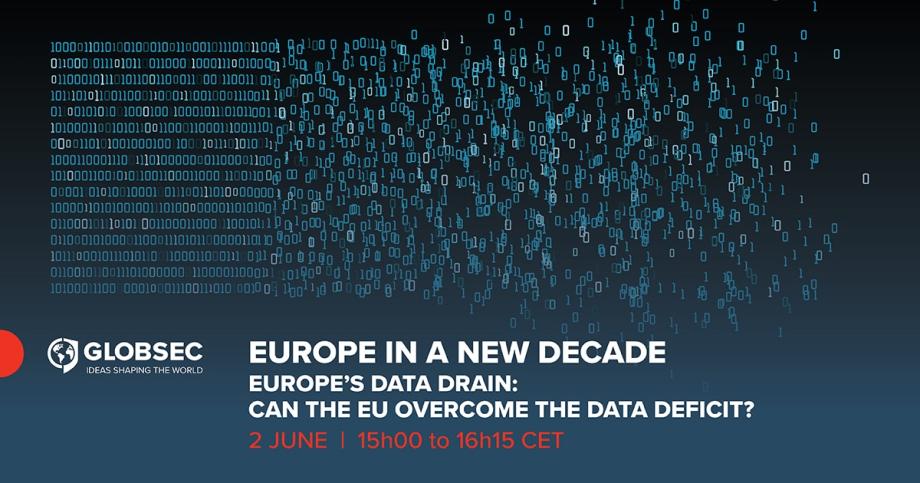02.06.2020 - Europe's Data Drain: Can the EU Overcome the Data Deficit?

2 June, 15h00 to 16h00 CET.
Big data is a strategic resource, but will Europe harness it? The EU is a leader in data regulation but this may come at the expense of its innovation and competitiveness. Change is needed to safeguard Europe’s digital sovereignty. Europe’s digital economy has also lagged and lacks assets comparable to the tech giants of other global leaders. However, the pandemic has the potential to change this trajectory. Anti-virus technology like contact-tracing apps will test Europe’s privacy principles but the economic stimulus could revive Europe’s digital innovation and competitiveness. How can investment in the digital industry be a key part of economic recovery? How can Europe transform its digital industry into a global competitor? Can privacy be protected in the post-COVID-19 world? How can we better assert our digital sovereignty?
Speakers:
- Eline Chivot, Senior Policy Analyst, Center for Data Innovation (confirmed)
- Hosuk Lee-Makyiama, Director, European Centre for International Political Economy (confirmed)
Moderated by Chris Stokel-Walker, Journalist
Main Messages
- Data is all around us and holds great potential for development if we can learn how to harvest, store, and apply it. It is anticipated that the data market will triple by 2025 and Europe´s ability to establish itself in the market of large-scale data analytics promises to be beneficial to both the private and public sectors.
- The Coronavirus pandemic has brought the European Union up to speed in data output. As individuals stay home, stream, and game, personal data use has soared. Half a decade of digitalization has occurred in just a few months and it is sure to be a new context for regulation.
- The European aspirations for data sovereignty and the independent development of the data market may not be the most beneficial. Little incentive exists for consumers to make an uncertain shift to new technology when familiar resources prove sufficient.
- The EU's desire to develop its own technological approach has served as a disadvantage to member states. When it came to Coronavirus contact tracing apps, many countries were slow in response due to a desire to independently develop apps, rather than simply use apps that were already made by other actors.
- Furthermore, the domestic isolation of this market would not serve to create a competitive data market but would stunt the progression as only large-scale actors hold the capacity and band-with to innovate and survive.
- Despite political pressures of de-globalist movements and the pursuit of ´strategic autonomy´ the European Union should not try to go it alone in the digital era. A successful development can be found in a balance between individual privacy and market cooperation.
We need to find a balance between #data and #privacy #regulations and then to be able to utilize the data
- Hosuk Lee-Makiyama
Eline Chivot
Data is crucial to success in the modern world. Every successful business model is now data-driven. It is not enough to simply have access to a massive amount of data, however, it must come with expertise, entrepreneurial skills, and smart regulations. The EU should invest in sectors where it is strong, such as manufacturing and smart cities. To successfully defend European values and interests, the EU must remain competitive in the digital economy. However, this should be done in cooperation with its allies, not alone. Projects such as Gaia-X may stray too close to protectionism to be useful and risk a balkanized digital world. Europe must consider whether its sovereigntist approach is the best suited for its needs.
Brussels understands the importance of data in the modern word, but its view may be simplistic at times.
- Eline Chivot
Hosuk Lee-Makiyama
We should question whether there really is a “data deficit” or whether there is instead a deficit in how we utilize data. Europe has massive amounts of technical, corporate, banking and telecom data but if we don’t learn to capitalize on this, then we will lose our domination of sectors such as retail. Unlike the strategic resources of the past, data is difficult to monopolize and storing it locally does not necessarily mean it is secure. We should also be mindful that our regulations don’t stifle competition as they may mean only the big players can follow the strict regulation, which strangles smaller firms. Europe should strive to find a balance between privacy and innovation. However, Europe is changing. COVID-19 has rapidly accelerated digitalization in Europe, which has helped it catch up with Asian countries.
If you look at data as commodity, then #EU is in the lead. We have data but there is capitalization deficit, we don’t seem to know how to use it.
- Hosuk Lee-Makiyama
See more highlights on Twitter: @GLOBSEC